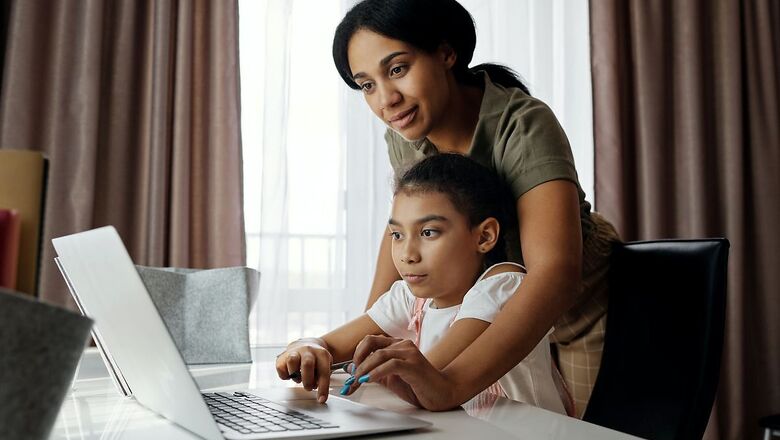
views
On March 11, 2020, the World Health Organization (WHO) declared COVID-19 a pandemic. Globally, COVID-19 has impacted the lives of everyone, including children and adolescents, in an unprecedented manner. While one hoped that the health, economic and psychosocial impacts of a year-long assault would recede in 2021 with a return to normalcy, the second wave of COVID-19 caught us unprepared.
Even as the medical infrastructure finds itself overwhelmed, the second wave is notable for its increased virulence, especially infecting children, with a higher morbidity and mortality in the younger population compared to the first wave. While much has been said about public health and safety measures, little attention has been devoted to the psychological factors—emotional distress and social disruption in children. We appear to be in the middle of a ‘parallel pandemic’ of mental health crises, affecting children and parents. India is home to an estimated 500 million children and adolescents. The fear of a “third wave” largely infecting children threatens to lead to unbridled panic among parents.
As health systems gear up to face this impending challenge, the onus is on parents and the community to be the bulwark against the hazards likely to be faced by children. And the good news is that it is imminently possible, if we prioritise public—read parents— education and awareness about both medical and mental aspects of COVID-19 pandemic.
When to Raise the Red Flag
While it is clear that the larger proportion of infected children will be asymptomatic (paediatrician colleagues are already finding the presence of anti-COVID antibodies in children without previous diagnosis of COVID-19), significant numbers of children will have symptoms like mild fever, cough, coryza, vomiting, loose motions, body ache and tiredness. These are the usual symptoms of any seasonal flu and are best treated symptomatically with paracetamol and other simple remedies, under the guidance of a regular family physician or paediatrician.
We are recommending parents maintain a simple symptom chart at home that could be shared with your doctor. I personally recommend you take time off from work for a day or two and supervise the child at home. Being aware and monitoring your child are of utmost importance. If there is any deterioration, it needs to be picked up as soon as possible. Prolonged and high-grade fever, breathing difficulties, poor feeding and vomiting, loose motions, dehydration, severe abdominal pain, headache, and most importantly, any significant and prolonged change in the child’s behaviour and demeanour, red and swollen eyes and lips, and rashes on the body should be a red flag for an urgent consultation with the paediatrician, who will take it up from there. Thus, simple precautions and some diligence for a few days will go a long way in taking care of the child and allaying your anxiety.
Behavioural Impact on Kids
Besides physical illness, parents need to be aware of the psychological and behavioural impact of the ongoing pandemic. It has been a year now and children are manifesting the ill-effects of a sudden, seemingly unending ‘new normal’, which has confined them indoors without the scaffolding benefits of extended families, neighbourhood, school, learning and peer interaction.
Prolonged isolation and departure from the routine amidst a sense of foreboding and gloom, heightened by the loss of lives especially in the second wave, have induced acute panic, anxiety, depression, irritability, inattention, boredom, obsessive behaviours, a fear of COVID-19 and paranoia, sleep disturbances and post-traumatic stress disorder (PTSD) in children. Due to increased screen time because of online education, problems like headache, dry eyes, weight gain, easy distractibility, gadget addiction, academic under-performance, regular absence from (virtual) class, online teacher bullying, cyber crimes, cyber bullying, are being reported with an increasing frequency.
Toddlers and children below 5 years of age show attention-seeking and regressive behaviours, like increased clinginess, thumb sucking, bed wetting, and may struggle to focus on or engage in playful activities as compared to pre-COVID times. They would be more fussy and demanding and may want to be fed or dressed or carried around by parents.
Children between 6-11 years of age are more inclined to show addiction to gadgets, ‘misbehaviour’, oppositional/defiant behaviour and temper outbursts. They may show mood swings, and may seem excessively sad and withdrawn or angry. Altered eating patterns with weight loss or gain and sleep disturbances may be seen over a period of weeks to months.
If you are a parent to an adolescent, understand and expect to see severe mood swings, irritability, anger and aggression. Poor self-esteem, struggling to experience pleasure, staying aloof and relationship issues as well as poor self-care, appetite, sleep and weight issues could point towards depression. Adolescents may remain hooked to gadgets. Academic under-performance as well as substance abuse is possible too. As a parent, you need to be particularly watchful for words or actions showing a tendency of self-harm.
Make a Schedule, Stick to It
But every dark cloud has a silver lining. The COVID era is not without its share of learnings and benefits. In my practice as a developmental behavioural paediatrician, I have seen that families who were well-adjusted and organized even before the pandemic have, in fact, come out stronger; so have families who saw the storm coming and got their act together. Few ground rules and some guidelines helped families organize their day better; staying together for months on end helped heal old wounds and discover new co-interests and ways to cohabit.
Parents who took this up as opportunity rather than a challenge found that engaging with the child was both a revelation and a blessing. Children with special needs, in fact, blossomed in the sunshine of increased parental interaction. There are a few suggestions that could be useful for any parent to engage with the child more fruitfully.
It is best to begin with you and your child making a schedule. The schedule should include the child’s daily personal chores as well as household chores appropriate for the child’s age. They can be a ‘helper’ for others in the family. For instance, cooking with the mother, watering the plants with the father, playing with siblings and so on and being rewarded for the same. Nothing succeeds like success and nothing works like a good reward—make the child feel appreciated for contributing at home, in howsoever small way.
Academics can be scheduled in the first half of the day when the child is mentally fresh; try and revise with your child what has been taught; provide examples, incorporate stories or events that the child can relate to. This helps the child grasp better and enjoy learning more. Do not push the child beyond the decided schedule—any compulsion will only make them detest it.
Make Time for Fun Activities
Activities should be developmentally appropriate for the child. Keeping little ‘fun corners’, like a basket of colourful books and reading them together, or a corner marked for some messy painting, solving puzzles, playing with clay, etc. are happy ideas. Music and movement go hand in hand; hold hands and dance! Looking and listening are a great way to bond—stand at the window and ask your child what they can see and hear. Incorporate ‘clean up time’ in a fun way so that things don’t get too cluttered, may be with some music on.
Stay-at-home can also be a time for learning for young children. You can start by keeping the academic books aside, instead introduce and encourage your child to keep a journal or scrap book or project book. This should be a guided activity as the child may not do this on their own. Together you can try out some easy-to-do science experiments. Provide good reading material to your child as per their interest. Discuss what they have read, ask them to describe it—this helps children improve their vocabulary and language skills.
Use board games like Monopoly to introduce your child to the basics of money and planning. Encourage them to take up activities like stamp and coin collections or performing arts, like dance, drama and music. Children love dramatising stories—social stories are a good way to instill values of care, teamwork and ownership. Discuss age-appropriate current events with them. Have family debates and discussions or antakshri contests. Do not miss celebrating birthdays or return of a family member from the hospital together, online.
Importance of Empathy and Guidance
Empathize with your adolescent child; they are perhaps losing the best time of their life. Relationships and lifelong friendships are formed at this age and we should be happy to indulge them. Allow your teenager to connect with friends and extended family digitally. Try to be non-judgmental; instead, instill hope. You are a role model for the child, now more than ever. Help them with studies but do not stress over academics. Focus on the ‘good behaviour’ more than the ‘bad behaviour; talk about what to do rather than what not to do. Do not over-react. Avoid having hushed discussions—include your child in decision-making to give them a sense of control and self-belief. This period is an opportunity to learn about responsibility, accountability, involvement and collaboration.
At all ages, listening helps! Avoid the ‘grown up’ urge to offer instant advice.
An hour or two of physical activity is important to stay healthy and it keeps the mind refreshed. A trampoline or other home equipment will come in handy. If permitted, the staircase area, especially during non-frequented hours, can be used for games. Yoga and meditation can be taught to older children. Limit exposure to news—an atmosphere of sad, gloomy, fearful information breeds anxiety and depression. Be watchful about gadget use; set rules and be consistent. Have screen-free hours, zones and days. Keep gadgets away from the child before bedtime; do not permit them to take their phone to bed. Prioritize as well as promote non-screen activities over screen time.
Over exposure to screen time can induce a range of behavioural and psychological changes at all ages, from hyperactivity to speech delay in tiny tots; red eyes, sleep disturbance, headache and fatigue in older kids. Guiding adolescents on cyber safety is a must. Sleep must be adequate and regular; incorporate it into the daily schedule right away.
This is part one of a two-part series on children and COVID by the author. You can read the second article here.
Read all the Latest News, Breaking News and Coronavirus News here. Follow us on Facebook, Twitter and Telegram.




















Comments
0 comment